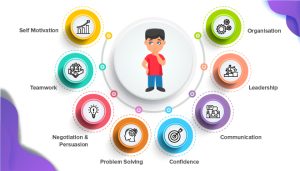Introduction:
Education is the cornerstone of progress, shaping not just individuals but entire societies. In an era defined by rapid technological advancements and shifting societal norms, the need for future-focused education has never been more pressing. This article delves into the significance of future-focused education, its role in shaping society, and why it is crucial for paving the way towards a brighter future.
Understanding Future-Focused Education:
Future-focused education goes beyond traditional learning methods, aiming to equip students with the skills and knowledge needed to thrive in an ever-evolving world. It emphasizes critical thinking, creativity, collaboration, and adaptability, preparing students not just for existing jobs but for the careers of tomorrow. By focusing on emerging technologies, global issues, and interdisciplinary approaches, future-focused education ensures that students are well-prepared to navigate the complexities of the modern world.
The Shift Towards Future-Focused Learning:

In recent years, there has been a noticeable shift towards future-focused learning paradigms. Schools and educational institutions are increasingly incorporating elements such as project-based learning, STEM (Science, Technology, Engineering, and Mathematics) education, and digital literacy programs into their curricula. This shift reflects the recognition that traditional educational models are no longer sufficient in preparing students for the demands of the 21st century.
Benefits of Future-Focused Education:
Future-focused education offers a myriad of benefits, both for individuals and society as a whole. By fostering innovation and creativity, it drives economic growth and development, creating a workforce equipped to tackle the challenges of tomorrow. Moreover, it promotes lifelong learning and adaptability, enabling individuals to thrive in an era of rapid change.
Equity and Inclusivity:
One of the key tenets of future-focused education is its emphasis on equity and inclusivity. By providing all students with access to high-quality education, regardless of their background or socioeconomic status, it helps bridge the opportunity gap and promote social mobility. In doing so, it creates a more equitable society where everyone has the chance to succeed.
The Role of Future-Focused Education in Society:

Future-focused education plays a pivotal role in shaping society on multiple fronts. From driving innovation to fostering social cohesion, its impact is far-reaching and profound.
Driving Innovation and Economic Growth:
In an increasingly globalized and technologically-driven world, innovation is the key to economic success. Future-focused education cultivates the skills and mindset needed to drive innovation, empowering individuals to think creatively, solve complex problems, and embrace new ideas. By nurturing a culture of innovation from a young age, future-focused education lays the foundation for economic growth and prosperity.
Fostering Social Cohesion:
Education is not just about acquiring knowledge; it is also about fostering social cohesion and understanding. Future-focused education promotes diversity, tolerance, and empathy, preparing students to thrive in multicultural environments. By encouraging collaboration and dialogue, it helps break down barriers and build bridges between individuals from different backgrounds, ultimately fostering a more cohesive and harmonious society.
Preparing for the Jobs of Tomorrow:

The rapid pace of technological advancement is reshaping the job market, creating new opportunities while rendering others obsolete. Future-focused education ensures that students are prepared for the jobs of tomorrow by equipping them with the skills and knowledge needed to succeed in emerging industries. From coding and data analysis to sustainability and entrepreneurship, future-focused education empowers individuals to chart their own course in an ever-changing world.
Promoting Environmental Sustainability:
As the global population continues to grow, so too do the challenges facing our planet. Future-focused education emphasizes environmental sustainability, instilling in students a sense of stewardship and responsibility towards the environment. By fostering an understanding of ecological systems and promoting sustainable practices, it equips future generations with the tools to address pressing environmental issues and build a more sustainable future.
Conclusion:
In conclusion, future-focused education is not just a means of imparting knowledge; it is a pathway to a better future. By equipping individuals with the skills, knowledge, and mindset needed to thrive in an ever-changing world, future-focused education holds the key to unlocking human potential and shaping a more prosperous and sustainable society.
____________________________________________________________
FAQs:
How does future-focused education differ from traditional education?
Future-focused education differs from traditional education in its emphasis on skills such as critical thinking, creativity, and adaptability. It prepares students for the challenges of the 21st century by focusing on emerging technologies and interdisciplinary approaches.
What are some examples of future-focused learning strategies?
Examples of future-focused learning strategies include project-based learning, STEM education, digital literacy programs, and interdisciplinary projects that integrate multiple subjects and skills.
How does future-focused education promote social equity?
Future-focused education promotes social equity by providing all students with access to high-quality education, regardless of their background or socioeconomic status. By bridging the opportunity gap, it helps create a more equitable society.
What role does innovation play in future-focused education?
Innovation plays a central role in future-focused education, driving economic growth and preparing students for the jobs of tomorrow. By nurturing a culture of innovation, future-focused education empowers individuals to solve complex problems and embrace new ideas.
How does future-focused education contribute to environmental sustainability?
Future-focused education contributes to environmental sustainability by instilling in students a sense of stewardship and responsibility towards the environment. By promoting sustainable practices and environmental literacy, it equips future generations with the tools to address pressing environmental challenges.
What are the long-term benefits of investing in future-focused education?
Investing in future-focused education yields long-term benefits for individuals, society, and the economy. It drives innovation, fosters social cohesion, prepares individuals for the jobs of tomorrow, promotes environmental sustainability, and creates a more equitable and prosperous society.










